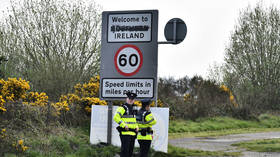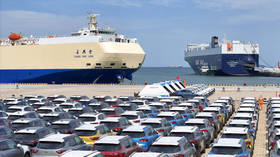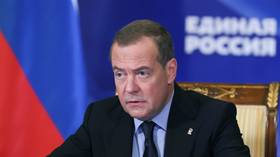Boris’s Brexit betrayal brings a united Ireland closer – but here’s why the South may think twice

The UK has admitted there’ll be customs checks in the Irish Sea post-Brexit, splitting a nation, proving Boris a Big Fat Liar and hastening a united Ireland. But does the South really want the North in its current state?
Well, nobody saw that one coming, did they? When Boris Johnson said last year that his Brexit withdrawal deal would absolutely, truer than the laws of physics, mean that “there will be no checks on goods from GB to Northern Ireland or Northern Ireland to GB,” everyone took him at his word. I mean, what reason did we have to doubt him other than facts, logic and Johnson’s long and distinguished history of talking out of, as they say in Ireland, his ‘hole.’
Now, Johnson’s government has confirmed that it doesn’t have the ability to bend space and time, let alone its legal requirement to have no physical border on the island of Ireland. Thus goods crossing the Irish Sea will undergo customs checks, no matter where they come from or land, with three control points in Northern Ireland. This, in effect, puts a border inside the UK, cutting Northern Ireland off from Great Britain (for those confused: England + Scotland + Wales = Great Britain; Great Britain + Northern Ireland = United Kingdom).
The whole affair has caused egregious damage to the noses and pride of Northern Irish unionists who, having supported the “leave” campaign and a weak Tory government, have been sacrificed at the Brexit altar.
It’s also got them increasingly twitchy about the prospect of a border poll on the reunification of Ireland. That’s because part of the Good Friday Agreement –signed in 1998 to bring peace and power-sharing to the North– states that the UK government must enable a poll if it “appears likely” that a majority of voters would “express a wish that Northern Ireland should cease to be part of the United Kingdom and form part of a united Ireland.”
Years ago it wasn’t a serious prospect, thanks to a dominant unionist/loyalist majority, but times and demographics have changed: Northern Ireland is a younger, more progressive, less sectarian place now - one which voted to remain in the EU, making the Republic of Ireland’s Brussels’ membership seductive to a lot of people. A poll in the North on reunification in February had the figures at 46.8 percent for staying in the UK, 45.4 percent for a united Ireland, and 7.8 percent sitting on the barbed wire fence. In summary, it’s tighter than the veritable gnat’s anus.
While that’s the case in the North, in the Republic of Ireland (the South, for ease), which would require its own border poll, it’s something of an open goal: the same survey in the South had 73.1 percent in favour of a united Ireland.
But should the South be so keen? Does it really want the North? I’m not so sure it’s a good idea right now.
Also on rt.com Arrogance of BoJo is fracturing UK into sovereign states & accelerating the break-up of the unionI say this as an Englishman who loves Northern Ireland. I married a woman from there, feel happy there, feel welcomed there, and think it’s one of the most beautiful places on this big round planet, despite the weather. Belfast easily matches Dublin as a city, the people are great and the beer is cheap. I love the South, too. I’d happily spend months travelling the whole gorgeous green island – if someone would pay me to do it.
I’m also 100 percent in favour of a united Ireland, having been educated by my in-laws in the centuries of atrocity visited on the Irish by the British. A history we don’t get taught in British schools, unsurprisingly.
However, if it happens now, what does the South get out of it? The Giant’s Causeway and Bushmills distillery, granted. A few more years of Game of Thrones tourists turning up dressed in Ikea wolfskin rugs. Not to mention the long-awaited “one in the eye” for the Brits.
However, as in Game of Thrones, peril also lies in the North. Because the South would be taking on a lot of baggage.
For a start, it’d be getting the poorest of the four UK nations as we hurtle into a global recession. Northern Ireland suffered the worst and longest after the 2008 crash. At the last count in 2018/19 it had 300,000 people –around 19 percent of the population– in absolute poverty and a similar number in relative poverty. And that’s before we boarded the current handcart to financial Hell. Companies that rode out the Troubles for 30 years are being decked by Covid-19. Danske Bank’s chief economist Conor Lambe said that the province “will experience a staggering decline in economic activity... due to the impact of the coronavirus pandemic.”
Then you have the significant issue of a dwindling yet passionate unionist/loyalist population, some of whom can without exaggeration be labelled extremist. For a government, it’s not a great look if your own citizens publicly burn your flag alongside effigies of the Pope. Or even resort to the violence that for so long blighted the North.
Issues like these are temporary, but they’re not going away any time soon.
“The Irish Question” was a phrase euphemistically used by the British ruling elite to describe the Irish nationalist movement. What their imperial minds were really thinking was “how do we crush these upstart bog dwellers?”
Now, though, other than a few impotent Little Englanders still grieving the loss of an empire they never knew, most Brits either support a united Ireland or are utterly indifferent on the matter. The Irish Question is a question for the Irish alone: whether to be A Nation Once Again?
It’s a question with an inevitable answer in the long run, so perhaps the South should wait.
Think your friends would be interested? Share this story!
The statements, views and opinions expressed in this column are solely those of the author and do not necessarily represent those of RT.
















